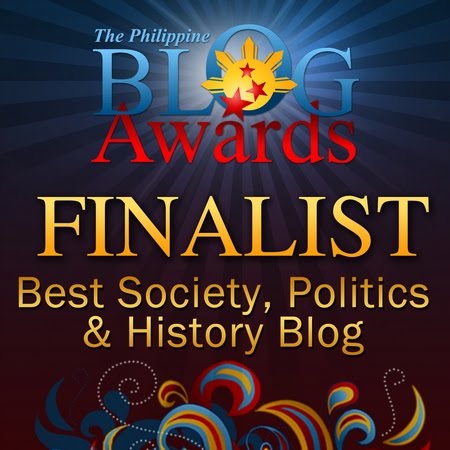Before I begin, I would like to apologize to Jon Royeca for not having responded immediately to his blogpost last September 13 which was his reply to my “Clarifying a misconception on the definition of ‘Filipino’” article because I’m still reeling from all this AlDub craze that’s sweeping the country (and, bit by bit, the world). Thankfully, Lola Nidora is now OK with Bae Alden and Yaya Dub seeing each other without any hindrance, so I believe this is the “tamang panahón” to answer him back.
By hinting that what I did last time was amateurish, I guess I have to be less courteous this time: the gist of Royeca’s understanding of the term Filipino is SHALLOW, I’m very sorry to say (I say this not to insult him; he simply inspired me to be frank). It’s as if he has already boxed himself to the shock of having encountered something “new”, i.e., Fr. Pedro Chirino’s definition of the word Filipino. There is more to it than that. But let’s first begin with his belittling of my use of Luis Rodríguez Varela’s poem “Qué Todos Seamos Buenos Filipinos“.
Royeca claims that “poems belong to the ambit of creative literature” and that “they can be purely fictional”. He “respectfully” added:
And so utilizing them as a source for one bold historical claim—like the peninsulares were the original Filipinos—is an amateurish and slapdash crack at historiography.
The above statement is merely his opinion, and I have to respect that no matter how condescending he may have sounded. Nevertheless, Rodríguez Varela’s poem was very much straight to the point. If only Royeca had an inkling of my language (Spanish), he should have realized that Rodríguez Varela made no hidden meanings in that poem. There were no ambiguities, no symbolisms, nor any other unfathomable forms of poetic diction. What you see is what you get.
Los primeros filipinos, vasallos son de Felipe. The first Filipinos were the vassals of King Felipe II.
These were Miguel López de Legazpi and those peninsular Spaniards, both military and friar, who were with him, who opted to stay here and die here. In effect, they ceased to become Spaniards. They became Felipenos or those who saw King Felipe II as their sovereign (in the same vein that the vassals of Carlos XI of Sweden were called Carolinos, the vassals of King Fernando VII Fernandinos, and so on and so forth).
Also, it is unfair to limit a historian to focus only on documents that have nothing to do with literature. Take, for example, a historian who wants to know more about the moods and sentiments of Filipino intellectuals towards the US invasion and occupation of Filipinas. Don’t tell me that the anti-US poetry of Claro M. Recto (“Oración Al Dios Apolo”), Cecilio Apóstol (“Al Yankee“), Jesús Balmori (“A Blasco Ibáñez“), and a host of others cannot be used as research material just because they “belong to the ambit of creative literature” (Royeca’s words).
And when I challenged Royeca to “point out any indigenous individual who called himself a Filipino during the Spanish times”, he answered back with “Jose (sic) Rizal and his fellow natives” which is, to borrow his words, a colossal blunder. The fact that I wrote indigenous individual in bold type and even underlined it is to emphasize something. Because, for sure, José Rizal was NOT an indigenous. He was a native of Filipinas but he was certainly NOT an indigenous individual.
To wit: indigenous and native may be slightly synonymous but are completely two different things. I am a native of Parañaque City but I’m certainly NOT an indigenous individual.
I trust that the historian in Royeca did no amateurish or slapdash crack in the comprehension of simple historical terms that experts like him should already know.
But Royeca, for FAILING to CATEGORICALLY define what a Filipino is, simply opted to beat around the bush. Nevertheless, I should not be too hard on him even if he belittled my use of poetry as a source material. After all, he has already boxed himself to the shock of encountering Fr. Chirino’s definition of Filipino. So I’ll just let him enjoy this refractory period of his.
Remember, boys and girls: declaring a historical evidence to the public to point out something is not enough. It always has to be interpreted with a good amount of critical thinking. And to end this, Royeca (and his partner Nonoy Regalado) should understand that IDENTITY has to stand on what you call YOURSELF and not what others CALL YOU.
AlDub You all,
Bae Pepe







Very well answered, Pepe! Very well because your answer is brimming with LOGIC and common sense which your adversary does not have at all. But then, these are the poor products of our mis-education in English and even in “Pilipino”. This mis-education is so loaded with HISPANOPHOBIA, or fear OF THINGS Hispanic, that just to avoid the FULL role of Spain in the formation of the FILIPINO STATE and the formation of the denizens of that STATE, who are THE Filipinos, an otherwise intelligent individual like your adversary has to look foolish if not stupid on this matter about WHO and WHAT is FILIPINO.
LikeLike
Simply put a Filipino nowadays is a person who lost their Spanish speaking part of the culture and the traditions in place of trying to be like Americans. They still got hispanic last names. Still no sense as to why they don’t call themselves Phillipians instead of the Spanish Filipinos. I am confused of what is wrong with the people there they don’t even speak great English. At the very least they could of done was kept Spanish official with English. If Aguinaldo and Rizal came back from the dead, they be surprised that no one speaks Spanish unless you are Gloria Arroyo and a few thousand others.
LikeLike
But Jon E. Royeca has already defined what a Filipino is on this blog:
http://jonroyeca.blogspot.com/2015/09/the-term-filipino-question-of-identity.html
And, oh, poems are not reliable sources because they are fictional work.
LikeLike
I’ve read this already, hence this blogpost (and the previous one related to it). We’re just going around in circles with what you’re sending me.
And what I’m asking your idol to do is to CATEGORICALLY DEFINE what a Filipino is.
“And, oh, poems are not reliable sources because they are fictional work.”
Halatáng-halatá na hindí mo binasa itóng blogpost co. Or if you did, you didn’t understand it at all. If the latter’s the case, that’s no longer my problem.
LikeLike
You’ve been answered na here:
http://jonroyeca.blogspot.com/2015/11/more-on-term-filipino.html
LikeLike
NICK JOAQUÍN would call these adversaries of Pepe Alas as “amnesiacs”, or people who are sick of amnesia or loss of memory, in this case our national historical memory. But what I see is that in the case of this group, what they have is not only amnesia but something much, much worse which is called “stupification” caused by something that has dumbed them forever. Yes, they have been truly victimized by US WASPo “educational LOBOTOMY” where they have been incapacitated to use their brain properly in this matter about who and what is FILIPINO. US WASPo colonialism has really done a good job in the annulment of many of our English mis-educated countrymen. But this mis-education is, of course, not their fault. We are all victims of our mis-education in English and even sectarian prejudice, if non-Catholic. And what is terrible is its hopelessness when we see “historians” who can not think and reflect on what is Filipino because of HISPANOPHOBIA, the fear of accepting the Spanish part of what composes the FILIPINO. And that Spanish part happens to be way over the 50% mark.
LikeLike
Jon answers here
http://jonroyeca.blogspot.com/2015/11/more-on-term-filipino.html
LikeLike
With due respect,I believe that only the Spaniards(Insulares and Peninsulares) have the right to call themselves Filipinos. Mestizos and Indios should call themselves “Spanish East Infians”.
LikeLike